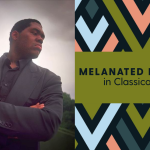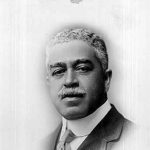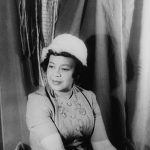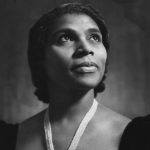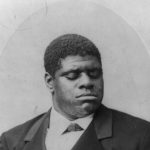Melanated Moments, S1E3: Laureate Libretto – Margaret Garner
The libretto for this week’s piece was written by poet laureate and iconic literary figure Toni Morrison. Margaret Garner is an opera that tells the story of an escaped slave who is captured but decides to kill her own children rather than see them forced back into slavery. Our own Angela Brown voiced one of the principal characters during the world premiere in Detroit, and she walks us through this powerful and thought-provoking opera.
Featured Music:
“Ease Yourselves,” “He Is By,” and “Epilogue” from Margaret Garner by Richard Danielpour, performed by soprano Angela Brown and pianist Cliff Jackson
MMCM Theme (00:15): [inaudible] Angela Brown (00:15): Hey everybody. It’s your co-host Angela Brown and I with my partner in creative crime, Mr. Joshua Thompson, back again to give you another Melanated Moment in Classical Music. Joshua Thompson (00:27): That is right. We are back. We are Black and we are super jacked to talk about more compositions and composers that we don’t hear a lot about. Angela Brown (00:38): [Laughs] Whew, you know, that boy is crazy! Joshua Thompson (00:38): Well, you know, I ain’t got no sense, but the above statements are true. But we’re here again because you know how we do. We like to talk about classical music. That’s what we highlight. That’s what we talk about. But I think it should be said, uh– because I know you won’t brag on yourself, but– truth be told Angela, we really could do an entire season just on you. No, I ‘m serious– Angela Brown (01:01): Could you really! Joshua Thompson (01:01): We could, because you’re no stranger to classical music. You’re no stranger to opera, and just everything that goes along with it. Because you have a tremendous career, from the Indianapolis Opera to the Metropolitan Opera of New York City to around the world. You’ve been there, done that. So yeah, I’m gonna brag on you a little bit! Angela Brown (01:20): Well, thank you. But I think it would be way more interesting and fun to talk about themes and ideas from some of our favorite and memorable pieces. Joshua Thompson (01:31): I think that’s a fantastic idea because there really is a lot to cover, right? We can spend this lifetime and the next and just barely scratch the surface, but we’re gonna do our best. So who do we have up–up first who we gone talk about? Angela Brown (01:43): Well, we’re gonna speak on a great composer, who happens to be a friend of mine, Mr. Richard Danielpour. We’re going to talk about a few of his works; one being Margaret Garner, which was the opera that he wrote along with the Poet Laureate Toni Morrison. Joshua Thompson (02:04): The late Toni Morrison, literary mother to many– Angela Brown (02:07): Many, oh yes! Joshua Thompson (02:07): –myself included. So it sounds like this piece we’re going to talk about, Margaret Garner, has got it all; connections between opera and music and even some inspiration from a literary genius. So why don’t you start us off by telling us a little bit about the composer Richard Danielpour? Angela Brown (02:26): Well, Richard Danielpour was born in 1956 and is of Persian and Jewish descent. When I tell you this man has a beautiful head of hair. Oh my goodness! I remember sitting up in rehearsal, and he would be in his composer angst. And he would take his hands and run it through that gorgeous mane. And I’m like, yes! Anyway, I digress. –He studied at Oberlin, New England conservatory, and Julliard. Joshua Thompson (02:57): Wow. Angela Brown (02:57): He taught at the Manhattan School of Music, Curtis Institute, and is currently teaching at UCLA. Joshua Thompson (03:04): Right. Angela Brown (03:04): And he has taught and studied under– Joshua Thompson (03:07): I read!– So it was– it’s Vincent Persichetti… Angela Brown (03:10): Yes. Joshua Thompson (03:10): So, I was a huge band geek and band nerd growing up, and if you grew up playing in symphonic bands, you know a lot and you have played a lot of Vincent Persichetti. Angela Brown (03:19): Oh, okay. Joshua Thompson (03:20): So yeah. Alright, so, that’s a little bit about him, but let’s hear about this piece. What’s the story of Margaret Garner? Angela Brown (03:29): It’s the story of a slave woman who, in 1856, escaped slavery with her husband– her whole family replete– and then upon being recaptured, she killed her children rather than to see them go back into the cruel institution of slavery. So, the whole opera begs the question: Do we charge her with murder or destruction of property? Joshua Thompson (03:54): Oh wow, like that? Angela Brown (03:55): Yea, it’s like that. And so when Richard went to Toni Morrison–Toni Morrison had actually wanted to write an opera at one point– and so she and Richard got to talking and actually the story that Richard came up with was the story she had already done, which was loosely based on– Joshua Thompson (04:13): Beloved, right? Love that book. Angela Brown (04:13): –Beloved, and it’s loosely based on Margaret Garner. And the role of Cilla was originally written for Jesse Norman. And I was covering Ms. Norman, but for whatever reasons she could not do the premieres and everything. So, I ended up doing the role of Cilla. Joshua Thompson (04:32): Oh, wow. Okay. So why don’t you tell us about that specific role? Who is Cilla? Angela Brown (04:38): Cilla is the matriarch of the family, and in the opera, she has three small arias. The first is Ease Yourselves, which is basically her prayer over the evening meal, after a long day of work. And she sings the blessing over the evening meal. Music plays (05:01): [Margaret Garner, “Aria No. 1,” sung by Angela Brown] Joshua Thompson (06:06): So, that’s Cilla’s first Aria, and it’s– it’s absolutely gorgeous, but I’m eager to know what’s the next one. Angela Brown (06:14): Then there’s the haunting duet between Margaret and Cilla called, He is By. It starts at the beginning of the second act, and Cilla is rushing around the cabin, gathering up Margaret and Robert’s belongings and the children’s belongings. And Margaret comes in and goes, “Mama, what are you doing?” She says, “You’re leaving tonight. You’re escaping tonight”. And then Margaret, excited, she’s looking through the things. So she goes, “But Mama, where are your things?” And Cilla goes on to tell her, you know: baby, I’m too old to run. This is about you and your life. Because remember, He is by–pointing up. He is ever by me. Music plays (06:57): [Margaret Garner, “Aria No. 2,” sung by Angela Brown] Joshua Thompson (07:48): Okay. And then the final Aria is in the Epilogue. So what happens in that? Angela Brown (07:56): The Epilogue is when– after Margaret has been brought back and she’s about to meet her fate– she decides to kill herself. So in the opera she hangs herself and then Cilla comes in, and she’s singing an epilogue that brings the townspeople together because during the whole process, there’s a Black chorus and a White chorus. We never even rehearsed together during this whole situation. Yeah, it’s deep. But Cilla, at the end, brings everyone together, and she sings Margaret’s soul, so to speak, on to heaven– on its journey. Music plays (08:38): [Margaret Garner, “Aria No. 3,” sung by Angela Brown] Angela Brown (09:58): So it’s– it’s a deep riveting opera. It’s one that makes you ponder and think, and Richard did a beautiful job. Joshua Thompson (10:06): Well, and it sounds like what you’re saying, with the White chorus and the Black chorus being separate in method, the intentionality behind putting it all together, let alone performing it down to every detail was on purpose. And so what’s that like when it all comes together in that Epilogue? Angela Brown (10:23): Well, we literally come together. You’ve seen both choruses mix on the stage, and we just blend our voices together. And we held hands, in that particular production, and we sang, and it was all inspiring and tear jerking and– Joshua Thompson (10:41): Chills everywhere. Angela Brown (10:41): Chills!– Because you are seeing Margaret’s body hanging, and it’s just making you ponder the thoughts of being separated from one another. Joshua Thompson (10:50): So– so let me ask you, because for me, this was one of the wonderful things I love about, not just classical music, but especially classical music that is very intentionally focused on Blackness and from a Black perspective. Cause Toni Morrison was very adamant about doing that. There’s a phenomenal interview with her and a BBC reporter where I think the reporter’s asking, “Well, do you feel bad about writing only from a Black perspective because it leaves so many people out– Angela Brown (11:13): It’s like: “I’m Black!” Joshua Thompson (11:14): –Honey, Toni Morrison was so unbothered, and she pretty much saw that as The Most Ridiculous Question I’ve Ever Heard. I was here for it. I was here for all of it, but this music has this ability to convey the weight and the honesty and the accuracy of a period in our American history for an entire group of people. And there is a lot to think about, almost too much to take in. From your recollection, what was the feedback or how do people digest this work? Angela Brown (11:43): Well, the thing is, with this work, it was a work that really showed off the American quilt. You had every genre of music; touches and snatches of jazz, of gospel, of blues, of classical. I mean, you had everything in this body of work and it left no one out, and people were genuinely moved. It was a wonderful experience to be able to be part of it from its inception, because it’s wonderful to be able to see your fingerprints– Joshua Thompson (12:21): Right. Angela Brown (12:21): –Put on a certain score because, you know, I can say I did that run first. That was me, that did that. So I mean, being able to just mold and make up a role– Joshua Thompson (12:32): I was gonna say, you’re defining the piece itself for the here and now and for the future. And that’s an honor– a humbling honor, I would assume! Angela Brown (12:41): Yes, definitely nothing that, uh, I take too big a head with, but I will– Joshua Thompson (12:47): Will put that on my list? Angela Brown (12:47): Yes, I was blessed to be able to, yes! Joshua Thompson (12:49): Absolutely. And I feel blessed to be able to chat about it and share it with everybody, but we’ll get into another one of Richard Danielpour’s works in the next episode. So for now, I’m Joshua Thompson… Angela Brown (13:02): And I’m Angela Brown. Unison (13:04): And this has been your Melanated Moment in Classical Music. End Credits (13:13): Melanated Moments in Classical Music is a production of Classical Music Indy. Our Producer is Ezra Bakker Trupiano. Our production intern is Auboni Hart. Our theme music was composed by Laura Karpman. Melanated Moments in Classical Music is proud to partner with CAAPA, the Coalition for African-Americans in the Performing Arts; supporting black classical musicians, opera singers, youth and others in the performing arts by bringing color to the classics. Learn more at four –that’s, the number 4caapa.org. Classical Music Indy- The Streaming and Podcasting is made possible by the Allen Whitehill Clowes Charitable foundation. Melanated Moments in Classical Music is proud to partner with Morning Brown Incorporated; working to bridge the gap between accessible, live music programs and underserved individuals, schools, and communities where the offering of classical music is rare or the cost of experiencing classical music is prohibitive. Learn more at morningbrown.org. MMCM Theme (14:33): [inaudible].
[/su_tab] [su_tab title=”Related Blog Posts” disabled=”no” anchor=”” url=”” target=”blank” class=””]LOCAL CLASSICAL – MELANATED MOMENTS SEASON SIX
As we continue celebrating Black Music Month, this week’s playlist will feature music and artists discussed during the latest season of Melanated Moments in Classical Music. All of season six was recently released and featured vibrant discussions about artists such as Scott Joplin, Hazel Scott, Joseph Bologne, and Kenneth Overton, among others.
LOCAL CLASSICAL – BLACK MUSIC MONTH
In this week’s playlist, we celebrate Black Music Month which takes place in June. It was created by President Jimmy Carter in 1979 to honor and celebrate Black artists’ contributions to music. We’ll be honoring the late Herman Whitfield III, an Indianapolis native who was a gifted pianist and composer. We’ll also hear performances of artists who have been featured in season four of Classical Music Indy’s podcast, Melanated Moments in Classical Music.
LOCAL CLASSICAL – MELANATED MOMENTS
In this week’s Black History Month playlist, we bring you recordings by composers, performers, and artists who have been highlighted in our podcast, Melanated Moments in Classical Music. Melanated Moments is the ward-winning podcast from Classical Music Indy that shines a spotlight on musical works composed by, for, and about Black people.
LOCAL CLASSICAL – HOST OKARA IMANI
Hey, Starshine! This is Okara Imani, Media Production Fellow for Classical Music Indy, and your guide to The “I” in Classical Music. I’m here to highlight the cultural and social intersections of the classical art form, beyond the Classical Period and beyond the constructs of Euro-centric high society origins.
Ric’key Pageot: Inspiring a Moment to Learn, Acknowledge, and Respect
Ric’key Pageot: Inspiring a Mo …
Ignatius Sancho: Composing the Hypocrisy of Colonialism & Convention
Ignatius Sancho: Composing the …
NEW CLASSICAL – DR. BILL BANFIELD
This week we bring you the music of Dr. Bill Banfield. Dr. Banfield is an award-winning composer whose symphonies, operas, chamber works have been performed and recorded by major symphonies across the country. Few have a wider, performed professional composing output, that has had public concert performances, reviews, radio, recordings of some 12 symphonies, 7 opera, 9 concerti, chamber, jazz, and popular forms. This alone making Dr. Banfield one of the most performed, recorded composers of his generation. In 2010 and 2016, Dr. Banfield served as a Pulitzer Prize judge in American music.
#AmplifyMelanatedVoices
Classical Music Indy stands with our Black community. We are here to listen, learn, and lend our support. We believe that classical music is powerful; that it evokes a range of human emotions and creative expression.
Angela Brown Brings her Unbridled Zeal to a New Podcast.
Angela Brown brings her unbrid …




